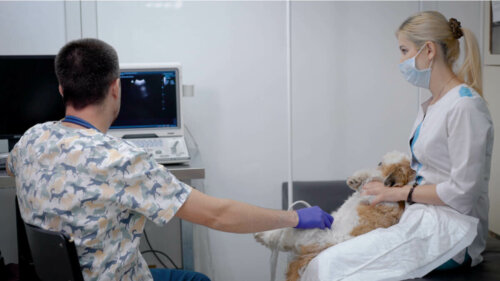Four Causes of Abdominal Effusion in Pets


Written and verified by the vet Érica Terrón González
The abdominal cavity is located immediately below the thorax, after the diaphragm. It reaches the pelvis. It contains most of the viscera involved in digestion, in addition to the urinary and reproductive systems. In healthy individuals or animals, this cavity is free from fluid. However, abdominal effusion in pets can be caused by many different conditions.
This accumulation of fluid is nonspecifically called ascites. It can’t be detected with the naked eye until there’s so much fluid that the abdomen swells. The liquid presses the viscera, abdominal vessels, and the thoracic cavity. Therefore, it’s a serious problem that must be correctly diagnosed for it to be treated.
Four causes of abdominal effusion in pets
Below, we’ll explain the four most common causes of abdominal effusion in pets.
Hemoabdomen
As its name suggests, this term means “blood in the abdomen”. It results from multiple causes and the bleeding can come from different organs, the most frequent being the liver and spleen. This condition usually derives from:
- Trauma
- The rupture of an intra-abdominal malignancy or tumor (hemangiosarcomas in the spleen are quite common in dogs)
- A coagulopathy – unfortunately, these conditions are quite common, as they’re caused by the consumption of rat poison
- Liver disease
Hemoabdomen is one of the most common pet emergencies. It requires immediate veterinary treatment.

Peritonitis
Peritonitis, by definition, is the inflammation of the peritoneum, the lining of the inner wall of the abdomen and cover of the abdominal organs. It can be septic (that is, with the presence of bacteria) or not. In the case of septic peritonitis, the abdominal fluid usually contains degenerating neutrophils.
The most common cause of septic peritonitis is a rupture, or perforation, of the gastrointestinal tract. This causes intestinal bacteria to spill into the abdomen, generating a serious infection.
Non-septic peritonitis can be caused by inflammatory processes of the viscera, such as pancreatitis or hepatitis. Veterinarians should always consider feline infectious peritonitis (FIP) as a possible cause of non-septic exudate in cats.
A particular case: biliary peritonitis
This kind of peritonitis occurs when the gallbladder ruptures and its contents spill into the abdominal cavity. The cause of the rupture can be trauma, a tumor, gallstones, etc. Biliary peritonitis is usually aseptic. However, bile can contain bacteria if it comes from an infected gallbladder. This means that the exudate is septic and the prognosis is poorer.
Uroabdomen or uroperitoneum
Uroabdomen is the result of a rupture in the urinary tract (most commonly a ruptured bladder). As a result, urine builds up in the abdominal cavity and will cause peritonitis due to chemical irritation. It’s one of the most common causes of abdominal effusion in polytraumatized patients.
In cats, for example, uroabdomen is common after a fall from a considerable height.
Chylous ascites, another form of abdominal effusion in pets
The accumulation of lipid-rich lymph (chyle) in the peritoneal cavity due to rupture or obstruction of the abdominal lymph ducts. Unlike what we observe in human medicine, this pathology is very rare in cats and dogs.
Chyle is a fluid that consists of bile, pancreatic juice, and lipids, and which is produced in the intestines during the digestion of fatty foods. The lymphatic vessels take it up, and, if these rupture, ascites occurs.
There have been cases in elderly cats, with an average age of 11 years. It’s usually due to an intra-abdominal malignancy (an abdominal tumor).
Do all the causes of abdominal effusion in animals have their origin in the digestive or urinary viscera?
The answer is no. In fact, one of the most common causes of effusion, be it in the chest or abdomen, is the circulatory system. For example, right-sided heart failure causes blood to pool or collect in the veins. This usually causes swelling in the extremities and abdomen. In other words, ascites occurs.
Other possible causes are thrombosis, portal hypertension, and hypoproteinemia.

In short, you can now see that this problem doesn’t always have either a digestive or urinary cause. This is why it’s very important to take your pet to a vet to get an accurate diagnosis and for the professional to discover the cause of the effusion. This way, they can proceed to treat it accordingly.
The abdominal cavity is located immediately below the thorax, after the diaphragm. It reaches the pelvis. It contains most of the viscera involved in digestion, in addition to the urinary and reproductive systems. In healthy individuals or animals, this cavity is free from fluid. However, abdominal effusion in pets can be caused by many different conditions.
This accumulation of fluid is nonspecifically called ascites. It can’t be detected with the naked eye until there’s so much fluid that the abdomen swells. The liquid presses the viscera, abdominal vessels, and the thoracic cavity. Therefore, it’s a serious problem that must be correctly diagnosed for it to be treated.
Four causes of abdominal effusion in pets
Below, we’ll explain the four most common causes of abdominal effusion in pets.
Hemoabdomen
As its name suggests, this term means “blood in the abdomen”. It results from multiple causes and the bleeding can come from different organs, the most frequent being the liver and spleen. This condition usually derives from:
- Trauma
- The rupture of an intra-abdominal malignancy or tumor (hemangiosarcomas in the spleen are quite common in dogs)
- A coagulopathy – unfortunately, these conditions are quite common, as they’re caused by the consumption of rat poison
- Liver disease
Hemoabdomen is one of the most common pet emergencies. It requires immediate veterinary treatment.

Peritonitis
Peritonitis, by definition, is the inflammation of the peritoneum, the lining of the inner wall of the abdomen and cover of the abdominal organs. It can be septic (that is, with the presence of bacteria) or not. In the case of septic peritonitis, the abdominal fluid usually contains degenerating neutrophils.
The most common cause of septic peritonitis is a rupture, or perforation, of the gastrointestinal tract. This causes intestinal bacteria to spill into the abdomen, generating a serious infection.
Non-septic peritonitis can be caused by inflammatory processes of the viscera, such as pancreatitis or hepatitis. Veterinarians should always consider feline infectious peritonitis (FIP) as a possible cause of non-septic exudate in cats.
A particular case: biliary peritonitis
This kind of peritonitis occurs when the gallbladder ruptures and its contents spill into the abdominal cavity. The cause of the rupture can be trauma, a tumor, gallstones, etc. Biliary peritonitis is usually aseptic. However, bile can contain bacteria if it comes from an infected gallbladder. This means that the exudate is septic and the prognosis is poorer.
Uroabdomen or uroperitoneum
Uroabdomen is the result of a rupture in the urinary tract (most commonly a ruptured bladder). As a result, urine builds up in the abdominal cavity and will cause peritonitis due to chemical irritation. It’s one of the most common causes of abdominal effusion in polytraumatized patients.
In cats, for example, uroabdomen is common after a fall from a considerable height.
Chylous ascites, another form of abdominal effusion in pets
The accumulation of lipid-rich lymph (chyle) in the peritoneal cavity due to rupture or obstruction of the abdominal lymph ducts. Unlike what we observe in human medicine, this pathology is very rare in cats and dogs.
Chyle is a fluid that consists of bile, pancreatic juice, and lipids, and which is produced in the intestines during the digestion of fatty foods. The lymphatic vessels take it up, and, if these rupture, ascites occurs.
There have been cases in elderly cats, with an average age of 11 years. It’s usually due to an intra-abdominal malignancy (an abdominal tumor).
Do all the causes of abdominal effusion in animals have their origin in the digestive or urinary viscera?
The answer is no. In fact, one of the most common causes of effusion, be it in the chest or abdomen, is the circulatory system. For example, right-sided heart failure causes blood to pool or collect in the veins. This usually causes swelling in the extremities and abdomen. In other words, ascites occurs.
Other possible causes are thrombosis, portal hypertension, and hypoproteinemia.

In short, you can now see that this problem doesn’t always have either a digestive or urinary cause. This is why it’s very important to take your pet to a vet to get an accurate diagnosis and for the professional to discover the cause of the effusion. This way, they can proceed to treat it accordingly.
All cited sources were thoroughly reviewed by our team to ensure their quality, reliability, currency, and validity. The bibliography of this article was considered reliable and of academic or scientific accuracy.
- Cavidad abdominal [Internet]. Es.wikipedia.org. [cited 3 July 2020]. Available from: https://es.wikipedia.org/wiki/Cavidad_abdominal#:~:text=La%20cavidad%20abdominal%20es%20la,encima%20de%20la%20cavidad%20p%C3%A9lvica.
- Hemoabdomen en perros y gatos: Una urgencia quirúrgica – Clinica veterinaria Madrid [Internet]. Clinica veterinaria Madrid. 2020 [cited 7 July 2020]. Available from: http://clinicaveterinariamadrid.es/hemoabdomen-perros-gatos-una-urgencia-quirurgica/#:~:text=Nos%20referimos%20a%20hemoabdomen%20en,son%20de%20h%C3%ADgado%20o%20bazo.
- Caballero D, Franch B, Riera X. Quiloabdomen felino: caso clínico [Internet]. Barcelona; 2003 [cited 7 July 2020]. Available from: https://www.avepa.org/
- King L, Boag A. BSAVA manual of canine and feline emergency and critical care. 2nd ed.
This text is provided for informational purposes only and does not replace consultation with a professional. If in doubt, consult your specialist.








